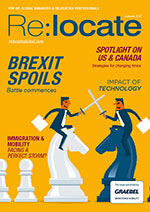Rising to the challenge: supporting inward investment
Overseas investment organisations are lining up to attract companies to their region of Europe, including the UK. What are they offering, and who are the companies supporting businesses on the move?

Related articles from the Brexit Business Planning Forum:
- Timing perfect for first HR forum in IRN Brexit Series
- The head, heart and brain of Brexit: HR’s role in managing uncertainty
- Brexit? See the bigger picture...
However, its attitude is very much one of partnership. In reality, Eric Menges, president and CEO of FrankfurtRheinMain, explained, not many organisations are coming to Frankfurt to find things out for themselves. He is surprised by the lack of knowledge and understanding of the decentralised system in Germany.Gergly Polner, head of Europe Public Affairs at Standard Chartered Bank, speaking on the same panel, explained that organisations wouldn’t need to relocate unless they had regulatory reasons to do so. His bank saw Europe as just one of its international regions, with Asia its prime expansion area and Africa further down the line.John Cryan, head of Deutsche Bank, told a bankers’ forum in Frankfurt in September, as reported in the UK press, “A major financial centre requires a complex ecosystem and the right mix of taxes, regulation and market breadth. There is only one European city that can fulfil these requirements, and that city is Frankfurt.”
Relocation moves need to tap in to expertise
London’s infrastructure is perceived to be unique, handling about 40 per cent of global currency trades, which are booked in London, and two-thirds of interest-rate derivatives in euros. Frankfurt is likely to be the top choice for the larger banks and financial institutions, because it is where the European Central Bank is headquartered.Paris and Amsterdam and the smaller financial hubs already appear to have been overtaken, despite HSBC’s setting the trend for Paris earlier in the year.We could see banks moving smaller numbers of staff – in the region of 200 to 300 – out of London, but, over the longer term, expansion in Germany and other European markets would evolve responding to market demand and outsourcing criteria. However, it is likely that momentum will pick up during 2018 and there will be a ripple effect. For more information, see Brexit: the great relocation battle.It is clear that international organisations large and small, and the relocation professions supporting their moves, should pay more attention to the inward investment bodies in regions throughout the UK, Europe and globally.Over the summer months, I have attended a number of events at which overseas and UK investment agencies have been present. Inward investment bodies provide access to a wealth of location knowledge about industry sectors in their region, as well as access to financial and set-up support and information ranging from property to infrastructure and workforce skills.Of course, access to support will vary across countries and regions, as will government and local regulations dictating the level of support on offer, but it is worth doing your homework if you are an employer or a supplier service.After all, back in the 1980s and 1990s, when the relocation industry emerged in the UK, the country’s regional development agencies and many of the ‘new towns’ both championed domestic relocation, including government bodies and not-for-profits moving out of London, and targeted foreign direct investment (FDI) moves, and they supported emerging industry clusters in these areas.It is worth checking out those suppliers who have a history and an understanding of the way in which inward investment works and can develop a partnering approach. Equally, relationships with suppliers who understand and can work effectively with export drive initiatives are also to be cherished. Don’t underestimate the level of expertise that already exists to navigate international growth.The relocation hot spots
London, the global hub
London is a hub for global business, with more $1 billion international subsidiaries than any other city. It is the number-one global city for FDI projects.London is a world-leading centre for the knowledge economy:- Digital technologies £5.3 billion
- First in the European Digital City Index oftech start-ups and scale-ups, ahead of Paris, Berlin and Amsterdam
- London and the South East have more employees in the technology and information sector than the state of California does
- London leads in fintech. It has 61,000 people working in fintech, compared with New York’s 57,000
- Stay open for commerce and trade
- Ensure firms can recruit international talent
- Protect and grow its strengths in financial and professional services
- Boost international travel and tourism to London
United Kingdom
With new trade agreements in the pipeline post-Brexit, the UK continues to draw investment from around the world. Some of the key locations for inward investment are:Scotland – Inward investment agency Scottish Development International pitches its offer at the fintech sector in particular. Scotland, it points out, is home to the UK’s second-largest financial services cluster, has a strong tech ecosystem, produces 15,000 tech graduates per year, and offers a competitive cost base. Major players with technology operations in Scotland include J.P. Morgan, Avaloq, Aberdeen Asset Management, and Morgan Stanley. Key centres are Edinburgh, Glasgow, Dundee and Aberdeen.The Midlands – One of the UK’s fastest-growing and most important areas, the Midlands combines excellent transport links and easy access to London with the benefits of a regional economy. Growth in entrepreneurial activity, a strong housing market, and a skilled workforce have seen it become an increasingly popular location for commercial investment, culture and tourism. The establishment of company HQs and investment from high-profile companies like Deutsche Bank, HSBC, Aviva, Barclaycard, Jaguar Land Rover Finance, and Experian have been integral to the recent transformation of key centres, which include Birmingham, Coventry, Leicester, Milton Keynes, Northampton, Nottingham and Wolverhampton. The planned High Speed 2 rail line is expected to bring further economic benefits.Leeds City Region – The UK’s largest city region outside London and the South East has recorded its most successful year to date in attracting foreign direct investment (FDI). Leeds City Region played a leading role in the success of the Yorkshire and Humber region, according to EY’s 2017 Attractiveness Survey, having been the only region in the Northern Powerhouse to see an increase in levels of inward investment. The Department for International Trade’s annual report showed that investment levels increased by 22 per cent, securing 100 successful FDI projects and creating and protecting over 3,000 jobs. Key sectors are financial and professional services, digital, healthcare and life sciences, and advanced manufacturing. Fashion brand Burberry and international healthcare company Covance have recently announced new investment in the region.Kent – Ideally placed for access to London, but with commercial property costs that are up to 60 per cent lower, Kent offers easy access to Europe via the Channel Tunnel and Europe’s largest ferry port, Dover. One of the South East’s biggest clusters of technology-focused businesses is at Kent Science Park, Sittingbourne. Other key sectors are life sciences, manufacturing, creative and digital.Related articles from the Autumn issue of our magazine:
- Brexit talent challenge: strategies and approaches
- Brexit: the great relocation battle
- Global mobility programmes and compliance: latest trends
Republic of Ireland
With its buoyant labour market and low corporate tax rate, the Irish Republic is an attractive location for inward investment, though skills shortages, particularly in IT, life sciences, technology and construction, can be a drawback.The high quality of life on offer makes Ireland a popular destination among expatriates. International assignees typically relocate to the capital city, Dublin, home to a third of the country’s population.Cartus’s latest Market Watch report for Ireland provides useful information on relocation and international assignment trends and practices, identifying key programme management challenges and giving practical advice on dealing with them. The challenges include:Housing – Availability of rental property is limited. To ensure they can move fast when they find suitable accommodation, assignees should have a bank account, an employment confirmation letter, and funds to pay the security deposit and the first month’s rent before undertaking their home-search trip.Schooling – As places in private and international schools are scarce, assignees choosing this type of education for their children should apply for places as far in advance as possible, and employers should send authorisation for school assistance to their relocation service provider as soon as an assignment is confirmed. State-school places can also be limited.Cultural issues – Employers should consider offering cross-cultural training to assignees and their families. The type of programme chosen should take into account the length of the assignment and the scope of the family’s relocation experience.Immigration – While all non-EU assignees require a work permit, some moving to Ireland will also need an Irish visa. Visa applications should be made as soon as an assignment is scheduled. As requirements for applications vary, Cartus recommends that assignees be prepared with the necessary documentation as early as possible.Pays de la Loire, France
The Pays de la Loire region has seen significant development in both the number of foreign companies setting up there and direct investment in local companies from abroad. Its highly skilled labour force is a major attraction.Pays de la Loire has the highest employment figures in France (excluding Paris), with 66 per cent of the working-age population employed. Its policy of Europewide cooperation holds huge appeal for businesses, and hosting events like the Le Mans 24-hour motor race and the Grand Depart of the 2018 Tour de France cycle race keeps it in the public eye.The region’s tourism sector is booming, with approximately 18 million visitors annually. Pays de la Loire’s 450 kilometres of picturesque coastline are varied, their sandy beaches, lively fishing ports and charming seaside resorts making this France’s best place for inpatriates to work. Pays de la Loire’s capital, Nantes, allows access to all major European hubs from Western France’s leading airport, with direct low-cost flights to six UK destinations (London, Bristol, Manchester, Birmingham, Southampton and Liverpool). Paris can be reached by TGV high-speed train in under two hours, and the Nantes-Saint-Nazaire Port is connected to 400 ports all over the world.Historically, the region has always been industry focused, with a leadership position in shipbuilding (STX), aeronautics (Airbus), food processing (Lactalis) and automotive. In 2016, over 50 per cent of foreign investment was related to industrial production and business services. Birmingham-based transmission leader GKN invested €20 million in its ‘factory of the future’ near Le Mans.Numerous high-tech companies have already established themselves in the area. Hosting October’s Ocean Energy Europe 2017 show and World Electronic Forum highlights the region’s commitment to boosting innovation in digital industries, the Internet of Things, and offshore energies.Contact Invest in Western France, www.invest-western-france.com
Pays de la Loire’s capital, Nantes, allows access to all major European hubs from Western France’s leading airport, with direct low-cost flights to six UK destinations (London, Bristol, Manchester, Birmingham, Southampton and Liverpool). Paris can be reached by TGV high-speed train in under two hours, and the Nantes-Saint-Nazaire Port is connected to 400 ports all over the world.Historically, the region has always been industry focused, with a leadership position in shipbuilding (STX), aeronautics (Airbus), food processing (Lactalis) and automotive. In 2016, over 50 per cent of foreign investment was related to industrial production and business services. Birmingham-based transmission leader GKN invested €20 million in its ‘factory of the future’ near Le Mans.Numerous high-tech companies have already established themselves in the area. Hosting October’s Ocean Energy Europe 2017 show and World Electronic Forum highlights the region’s commitment to boosting innovation in digital industries, the Internet of Things, and offshore energies.Contact Invest in Western France, www.invest-western-france.comSaxony-Anhalt, Germany
Although the impact of Brexit is still uncertain, the referendum result is already proving challenging for companies based in the UK. The possible imposition of tariffs on exports from the UK to the European Union, or loss of access to the single market, is leading businesses to restructure their strategic alignment in Europe.The Investment and Marketing Corporation Saxony-Anhalt (IMG) is the German federal state’s economic development agency, acting as a partner for international companies that are planning to locate themselves in Saxony-Anhalt.Situated at the heart of Europe and in the centre of Germany, Saxony-Anhalt is an ideal location for business, with fast transport links to the growing markets of Western and Eastern Europe. Its capital is Magdeburg, and its largest city is Halle.IMG can provide information and advice on the region’s Brexit-relevant sectors – chemicals and plastics, mechanical and plant engineering, food, and automotive – and its investment advantages.Hamburg, Germany
Inward investment agency HWF Hamburg Business Development Corporation promotes Hamburg as a business location at a national and an international level. More than 6,000 international companies have already settled there.The agency’s offering, which includes location consulting, commercial real-estate services, and advice and support around investment and development projects, is aimed at small and medium-sized enterprises in particular.Hamburg is keen to attract UK companies planning to relocate their operations after Brexit, emphasising the strong business links between the city and Britain, the roughly 4,000 British citizens who already live there, and the fact that a fair focusing on Great Britain – the ‘British Flair’ – has been held in Hamburg for the past 26 years.As a gateway to the EU, Hamburg offers many advantages. International flight connections are excellent, while costs, the agency says, are modest. Average monthly office rents in good locations on the River Elbe range from €15 to €25 per square metre.Catalonia, Spain
Catalonia is ranked consistently as one of Europe’s top investment destinations. It boasts a well-established industrial tradition and an expanding ICT sector that forms the basis of a competitive and diversified economy. Exports account for 30 per cent of Catalan GDP, with chemicals, automotive, food and drink, textiles and fashion, pharmaceuticals, and machinery as leading sectors.This helps to explain why the Financial Times, in its latest report on the most attractive European locations for future investment, named Catalonia Southern European Region of the Future.Foreign investment in the region has reached record figures in recent years. From Barcelona’s consolidation as a major hub for start-ups to significant investment from corporations such as Amazon, Cognizant and Hewlett-Packard (HP), there are currently more than 7,000 multinationals operating out of Catalonia. They value its diverse and competitive economy, its excellent transport links with the rest of the world, and its capacity to attract investment and talent, both local and international.Top companies are siting their global R+D centres (HP) or digital hubs (Nestlé) in Catalonia.Catalonia Trade & Investment, an agency of the Catalan government, provides international companies considering investing in the region with support, insight and advice. It offers complimentary, specialised and confidential services to international investors and corporations.Relocation Management Companies supporting company or employee moves
- Cartus, cartus.com
- SIRVA, sirva.com
- Lexicon Relocation, lexiconrelocation.com
- Altair Global Relocation, altairglobal.com
- Weichert Workforce Mobility, weichertworkforcemobility.com
- TheMIGroup, themigroup.com
- Graebel, graebel.com
- Santa Fe Relocation Services, santaferelo.com
- Beswick Relocation Services, beswickrelocationservices.com
- Clearview Relocation, clearviewrelocation.com
- Icon Relocation, iconrelocation.com
Collaborative approach to change
As Relocate has said many times before, few, if any, organisations are untouched by global trends and influences. The pace of change across the bigger picture impacts large and small, from the NHS to pharmaceutical companies, the energy sector, the car industry, the digital economy and the services sector.However, piece by piece, by analysing the risks and charting certainty and uncertainty, with a strategic approach and the ability to be agile, open and transparent and to communicate well, most companies will be able to steer a steady course.Business and membership organisations seem to be showing signs of coming together to reinforce their knowledge base and put their case to government and regional decision-makers. Global mobility associations can also work more collaboratively to support the growth agenda and cross-border working.Over the coming months, Relocate will be deepening its coverage of regions and countries across all its media, to help employers and relocation professionals make informed decisions about potential relocation destinations. We will be leading study tours and fact-finding missions to destinations throughout the UK and Europe, and further afield to international relocation hotspots and emerging destinations. To find out more, contact Vanessa@relocatemagazine.com or call +44 (0)1892 891334.
 Get access to our free Global Mobility Toolkit
Get access to our free Global Mobility Toolkit  © 2017. This article first appeared in the Autumn 2017 edition of Relocate magazine, published by Profile Locations, Spray Hill, Hastings Road, Lamberhurst, Kent TN3 8JB. All rights reserved. This publication (or any part thereof) may not be reproduced in any form without the prior written permission of Profile Locations. Profile Locations accepts no liability for the accuracy of the contents or any opinions expressed herein.
© 2017. This article first appeared in the Autumn 2017 edition of Relocate magazine, published by Profile Locations, Spray Hill, Hastings Road, Lamberhurst, Kent TN3 8JB. All rights reserved. This publication (or any part thereof) may not be reproduced in any form without the prior written permission of Profile Locations. Profile Locations accepts no liability for the accuracy of the contents or any opinions expressed herein.


































